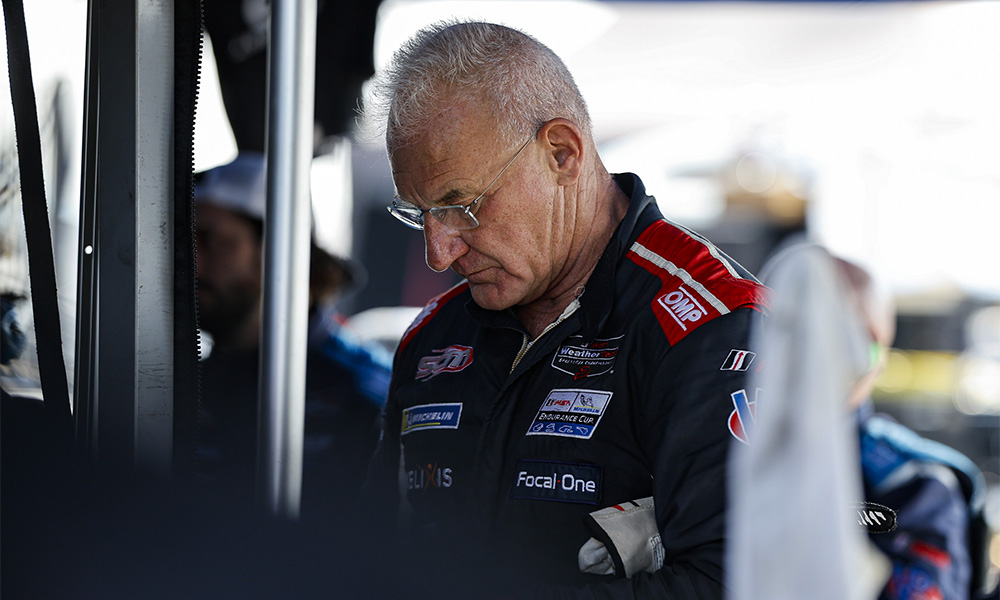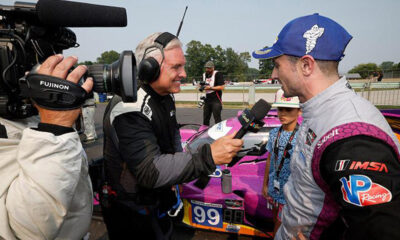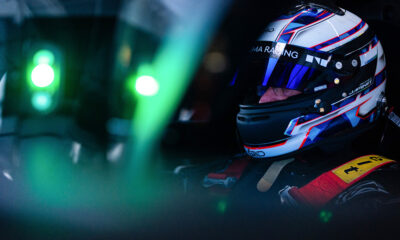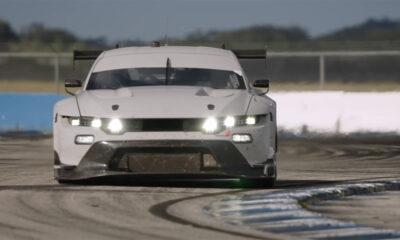
Photo: Sean Creech Motorsport
Sean Creech Motorsport will once again carry the Canadian flag on its entry in the WeatherTech SportsCar Championship’s Chevrolet Grand Prix at Canadian Tire Motorsport Park this weekend.
The story behind the livery involves family, a hidden room, an incredible escape from pre-World War II Czechoslovakia – and a family that was welcomed by Canada, able to create a new life in their new country.
The No. 33 Ligier JS P217 Gibson driven by Lance Willsey and Joao Barbosa will carry the Canadian flag, a tradition begun by Willsey when he first raced a Ligier JS P320 Nissan in IMSA Prototype Challenge (now the VP Racing Challenge).
Willsey provided insight as to why the family carries such an appreciation to the country of Canada.
“My mother’s family came to settle in Niagara Falls, Ontario when they were forced to leave Sered, Czechoslovakia due to the oppressive conditions brought upon the Jewish people there in the late 30s and early 40s,” said Willsey. “I’m so appreciative to Canada for taking them in, so I honor that every year with the Maple Leaf livery.”
Willsey’s mother’s family – her mother, father, and brother – lived in Sered in what is now the Czech Republic. The extended family included brothers and uncles, spouses and children, owning and working together in a variety of business ventures.
His grandfather was Jewish but his grandmother was Catholic, which shielded her and the children from the Nazi inquisition.
As the 1940s began, a forced labor camp was established near Sered which became a transition point to some of the concentration camps in Poland.
Willsey’s grandparents’ families were being slowly rounded up, put on trains and buses, and taken to the forced labor camp to work under a variety of conditions, but many of them ended up in concentration camps in Poland and where killed.
“At some point in time, the powers that had aligned with the Axis in Germany took interest in finding my grandfather, primarily because he was a fairly wealthy man, a successful businessman, and a leader in the community,” Willsey recalled.
“They sought him out, coming to the house on multiple occasions in search of him. They spared my grandmother because she was Catholic and spared my mom and her brother – my mom was probably around five or six years old at the time, and my uncle was an infant.
“Soon it became untenable for my grandfather to try to remain at the house. So when the military showed up searching for him, he left the house and went and lived in the woods, because he could not safely come back to the house.
“The family lost contact with him – they did not know his whereabouts, or if he was safe or not.”
Hoping for her husband’s return, Willsey’s grandmother had a false wall constructed in the house and placed the wood burning stove in front of it to hide it.
Eventually, her husband returned, and they boarded him into the tiny room that had a small space to slide a plate of food in. His grandfather spent months living in this room with no daylight and no human contact, other than hands touching his through this space where the family could share a plate of food with him.
Meanwhile, his grandmother watched more and more family members taken away, never to be seen again, as also found themselves in hiding. Clearly, the time to act had come and soon, a plan began to develop.
“My grandparents family, including my grandmothers brothers and uncles, sold everything they could sell given the constraints placed on them, and converted the money into diamonds, which were the densest form of wealth that they could travel with, and then bought train tickets for each one of them to get on a train to an uncertain destination,” said Willsey.
“They never knew where they would end up, they just entrusted someone to get the family out of there – though it’s my understanding that initially, safety was not defined. It was just somewhere where Jewish people could safely live.”
Willsey’s grandfather, grandmother, and – to Willsey’s knowledge – several of his brothers and uncles, and their spouses and children, traveled in whatever conveyance they could (from false floors of railroad cars to buses) and through a long circuitous route, they ended up in Niagara Falls, Ontario – with the clothes on their backs and the diamonds in their pockets, to start a brand-new life.
“Each of the brothers and uncles started a different business, some of which remain to this day,” he said. “One went into the dry goods business and sold clothing, and I believe his store still exists in Niagara Falls.
“My other uncle went into the cattle and meat packing industry, and my grandfather went into the clothing business with my grandmother, who sewed clothes in their workshop and helped him fill his car with clothes as he traveled around Ontario selling clothes out of the back of his station wagon.
“And that’s how they restarted their lives. Happily, there were some non-Jewish friends in Sered that hung onto some of their possessions, in the hope that they would survive and could be reunited at some point.
“After the war they were able to get back some of their furniture, and some artwork. Things that reminded them of home. Many of them are still there, I see them whenever I go to Canada.
“So I have an incredible sense of gratitude to Canada, because Canada provided the destination, the safe haven, for my mom’s side of the family.
“My mom’s brother and uncle still live in Toronto, though slowly, just by time, that generation is moving on.
“Putting the Canadian flag on our race car is my way of remembering them, of remembering that Canada was willing to take them in. It my way of saying thank you.”

























